|
January 2006

 Maribel's Story
Maribel's Story | Cristina | Rosario | Hector | Maribel |
|---|---|---|---|
 |
 |
 |
 |
(Pamphlet available in PDF (4 MB); also available in en Español (Spanish).)
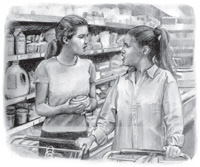 Cristina: Oh look, they have Queso Fresco here. But it doesn't taste the same as the kind we used to eat in Mexico. Remember
how our mothers would buy the milk fresh from the dairy farm and make the cheese at home?
Cristina: Oh look, they have Queso Fresco here. But it doesn't taste the same as the kind we used to eat in Mexico. Remember
how our mothers would buy the milk fresh from the dairy farm and make the cheese at home?
Rosario: Yes, I remember. But eating Queso Fresco like we used to isn't worth the risk - especially after the tragedy that happened to my neighbor Maribel.
Cristina: A tragedy? What happened?
Rosario: Oh, it's so sad - I thought you heard. Maribel ate Queso Fresco she bought from a vendor selling cheese door to door . . .
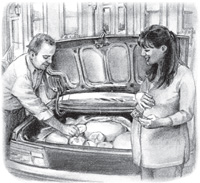
Maribel: Wow - Queso Fresco just like in Mexico!
Gonzalo - Vendor: I make it myself - like my dad used to make back home. I get raw milk straight from a local farmer. There's nothing like it in the stores in the U.S.
Maribel: I crave the taste of homemade Queso Fresco like I remember from home. I'll take two packages. Thank you!
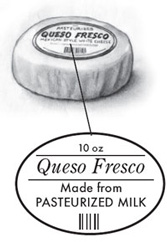 Rosario: Maribel didn't know
to ask, but the cheese she bought
was not made with pasteurized
milk.
Rosario: Maribel didn't know
to ask, but the cheese she bought
was not made with pasteurized
milk.
Cristina: What does this mean, "pasteurized"?
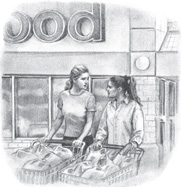 Rosario: When cheese is made
from pasteurized milk, it means that the milk used to make the cheese has been processed to kill bacteria. See, look at this label
- "Made from Pasteurized Milk."
Rosario: When cheese is made
from pasteurized milk, it means that the milk used to make the cheese has been processed to kill bacteria. See, look at this label
- "Made from Pasteurized Milk."
Rosario: Unfortunately, this was not the case with the cheese Maribel bought. It hadn't been pasteurized to kill bacteria. All she wanted was to eat cheese that tasted like the kind made in Mexico - but instead, the Queso Fresco she bought from the door-to-door vendor was contaminated with bacteria called Listeria.
Rosario: For awhile, Maribel felt fine. But then, she started to feel sick...
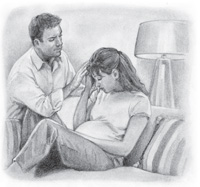 Maribel: Hey, Papi, I'm not feeling great.
Maribel: Hey, Papi, I'm not feeling great.
Hector: Mi amor, don't worry - go to bed, and get some rest.
Rosario: But several days passed and Maribel didn't feel any better. Her husband Hector started to worry. Finally, one night he convinced her to go to the hospital.
Cristina: What happened?
Rosario: She lost her baby. It turns out that she had gotten an infection called listeriosis and she passed it to her baby without knowing it.
Cristina: Oh, no. She lost the baby because of bacteria from the cheese?
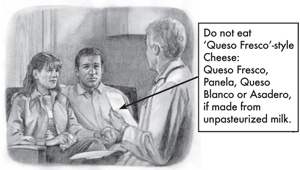
Dr. Nieves:I'm sorry, Mr. and Mrs. Sanchez. Your baby was stillborn. She died from an infection called listeriosis. You passed this infection onto your baby without even knowing it.
You can get infected with the Listeria bacteria from eating Queso Fresco made from unpasteurized milk. There are several types of queso fresco-style cheeses that might be unpasteurized, and pregnant women shouldn't eat them.
Do not eat 'Queso Fresco'-style Cheese:
Queso Fresco, Panela, Queso Blanco or Asadero, if made from unpasteurized
milk.
Rosario: Unfortunately, like many Latina women who crave the taste of Queso Fresco from home, Maribel didn't know to look for the "pasteurization" label - and because of that, her unborn baby got sick and died. Dr. Nieves said that the symptoms of listeriosis can include fever, chills, muscle aches, upset stomach, nausea and/or diarrhea. But then, Dr. Nieves also said that it's very common for a pregnant woman to have listeriosis and not even know it because she doesn't feel sick. That's why it's so important to avoid eating cheese made from unpasteurized milk or cheese made from unknown sources.
Cristina: Wow - that is scary. Poor Maribel and Hector.
Rosario: I know. But what happened to Maribel and Hector doesn't always happen. You can usually treat listeriosis with antibiotics that help the mother and the unborn baby. Your doctor can give you a blood test to see if you have it - so women who have eaten cheese made with unpasteurized milk can go to the doctor and get checked out. But in Maribel's case it was too late.
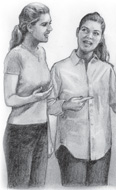
Attention Pregnant Women
Some Cheeses Could Harm Your Unborn Baby!
Cristina: Maribel's story makes me so sad. But one important thing we can do is tell other people about this - especially friends who are pregnant, and their families.
Rosario: That's right. Hector and Maribel have been spreading the word, too. They believe that one good thing that can come from this terrible tragedy is to prevent it from happening to anyone else.
Cristina: You can count on me to help spread the word . . .